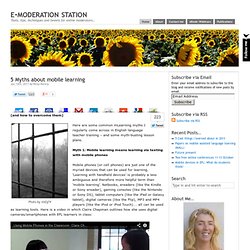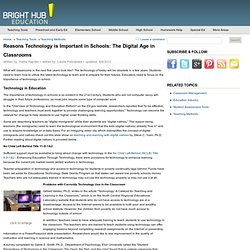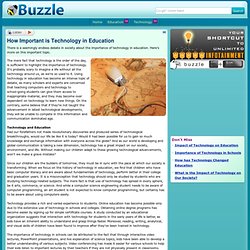

Why iPads Aren't The Answer (But Still Important) Le papier ne sera jamais mort / Paper is not dead ! Funny, right?! We love this ad because it so beautifully illustrates the dichotomy between tech adopters and tech resistors. And perhaps more importantly, it shows that some things are best left low-tech. How does this relate to early childhood? There are many people opposed to using technology in early childhood education because they see it as a replacement to tried-and-true, developmentally appropriate practices. Does this mean we should be afraid of iPads and resist them entirely? How should we use iPads with young children? In his recent blog post for the Fred Rogers Center, children’s media specialist David Kleeman says, “Don’t insert technology when the real-world experience is better.”
So, is it better to create “real-world” art or digital art on an iPad? There’s room for both. Is Technology Making Your Students Stupid? - Technology. By Marc Parry Multimedia—dangerous!

Online research—depthless! Classroom screens—dubious! If you're looking for a contrarian take on technology, Nicholas Carr is your man. In 2003 the author touched off a debate about the role of computers in business with his article "IT Doesn't Matter. " Now the 51-year-old, Colorado-based writer has published a new book, The Shallows, which warns that the Internet is rewiring our brains and short-circuiting our ability to think. Q. A. Q. A. 5 Myths about mobile learning. [and how to overcome them] Photo by stefg74 Here are some common mLearning myths I regularly come across in English language teacher training – and some myth-busting lesson plans.

Myth 1: Mobile learning means learning via texting with mobile phones Mobile phones (or cell phones) are just one of the myriad devices that can be used for learning. ‘Learning with handheld devices’ is probably a less ambiguous and therefore more helpful term than ‘mobile learning’. Myth 2: Mobile learning means ‘learning on the move’ This is one of the most common definitions of mobile learning I hear. *Thanks to Neil Ballantyne for alerting me to this theory, which states that all learners will have a long bus ride to work/school in which they will want to look at flashcards or similar. Pros andcons of tech.
Why Integrate Technology into the Curriculum?: The Reasons Are Many. VIDEO: An Introduction to Technology Integration Running Time: 5 min.

Technology is ubiquitous, touching almost every part of our lives, our communities, our homes. Yet most schools lag far behind when it comes to integrating technology into classroom learning. Many are just beginning to explore the true potential tech offers for teaching and learning. Properly used, technology will help students acquire the skills they need to survive in a complex, highly technological knowledge-based economy. Integrating technology into classroom instruction means more than teaching basic computer skills and software programs in a separate computer class.
Many people believe that technology-enabled project learning is the ne plus ultra of classroom instruction. The myriad resources of the online world also provide each classroom with more interesting, diverse, and current learning materials. The Importance of Technology in Schools for the Digital Age. Effective Use of Technology in the Classroom Beyond the students' future, learning that is fun, hands-on and challenging will engage the student.

The Internet has opened up so many avenues for teachers to teach content. Teaching in 3-D A new emerging technology in the classroom is using the multi-media 3-D projector. Students can be engaged with 3-D presentation in any subject area, such as seeds emerging from the ground and growing into a full plant to an event in history. Skype, Web quests & Google Apps For example, teacher can use Skype to allow a foreign language student speak with a person from that foreign country.
If teachers are somewhat unsure about using the Internet in the classroom, a web quest is an easy way to wade into using technology in the classroom or computer lab. Another Internet application is allowing students to work on a project simultaneously through Google Apps. White Boards and Clickers. How Important is Technology in Education. The mere fact that technology is the order of the day, is sufficient to highlight the importance of technology.

It's probably scary to imagine a life without all the technology around us, as we're so used to it. Using technology in education has become an intense topic of debate, as many scholars and experts are concerned that teaching computers and technology to school-going students can give them access to inappropriate material, and they may become over dependent on technology to learn new things. On the contrary, some believe that if they're not taught the advancement in latest technological developments, they will be unable to compete in this information and communication dominated age.
Technology and Education Had our forefathers not made revolutionary discoveries and produced series of technological breakthroughs, would our life be like it is today? Would it had been possible for us to gain so much knowledge and exchange information with everyone across the globe?